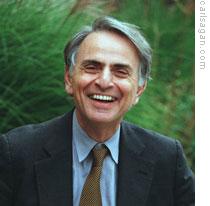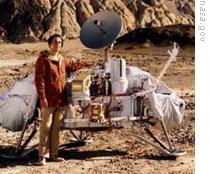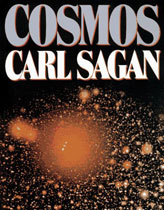VOA慢速英语 2008 1210b
时间:2018-12-01 作者:英语课 分类:VOA慢速英语2008年(十二)月
This is Shirley Griffith.
VOICE TWO:

Carl Sagan
And this is Steve Ember with the VOA Special English program Explorations. Today we tell about American scientist Carl Sagan. He spent much of his life helping 1 make space travel possible far out in the universe. He also helped people understand science.
(MUSIC)
VOICE ONE:
The year is nineteen forty-seven. Twelve-year-old Carl Sagan is standing 2 outside a small house in the eastern city of Brooklyn, New York. It is dark. He is looking up at the sky. After a few minutes, he finds the spot for which he has been searching. It is a light red color in the night sky. Carl is looking at the planet Mars.
Carl has just finished reading a book by American writer Edgar Rice Burroughs. It is the story of a man who travels from Earth to the planet Mars. He meets many strange and interesting creatures there. Some of them are very human. The name of the book is “The Princess of Mars.” It is just one of many books that Mister Burroughs wrote about travels to Mars.
VOICE TWO:
In “The Princess of Mars,” the man who travels to Mars can make the trip by looking at the planet for several minutes. He then is transported there by a strange force.
Carl Sagan stands watching the red planet. He wishes he could travel across the dark, cold distance of space to the planet Mars. After a while, young Carl realizes this will not happen. He turns to enter his home. But in his mind he says, "Some day. . . Some day it will be possible to travel to Mars. "
VOICE ONE:
Carl Sagan never had the chance to go to Mars. He died in December, nineteen ninety-six. However, much of the work he did during his life helped make it possible for the American Pathfinder vehicle to land on Mars. It landed on July fourth, nineteen ninety-seven. It soon began sending back to Earth lots of information and thousands of pictures about the red planet.
Carl Sagan's friends and family say he would have been extremely happy about the new information from Mars. They say he would have told as many people as possible about what Pathfinder helped us learn.
VOICE TWO:
Carl Sagan was a scientist. He was also a great teacher. He helped explain extremely difficult scientific ideas to millions of people in a way that made it easy to understand. He made difficult science sound like fun.
(MUSIC)
VOICE ONE:
Carl Sagan was born in Brooklyn, New York in nineteen thirty-four. Even as a child he wanted to be a scientist. He said it was a child's science book about stars that helped him decide to be a scientist.
Mister Sagan said he read a book that told how our sun is a star that is very close to Earth. The book also said that the stars in the night sky were also suns but very far away. Mister Sagan said that suddenly, this simple idea made the universe become much larger than just Brooklyn, New York.
VOICE TWO:
It should be no surprise to learn that Carl Sagan studied the stars and planets when he grew older. He did this at the University of Chicago. Later he taught astronomy at Harvard University and Cornell University.
In the nineteen fifties, Mister Sagan helped design mechanical devices for use on some of the first space flights.
He also published two important scientific theories that were later confirmed by space flights. One theory was that Venus is extremely hot. The other was that Mars did not have a season when plants grew as scientists had believed. He said that the dark areas on Mars that were thought to be plants were really giant dust storms in the Martian atmosphere.
VOICE ONE:

Carl Sagan with a model of NASA's Viking spacecraft
Mister Sagan was deeply involved in American efforts to explore the planets in our solar system. He was a member of the team that worked on the voyage of Mariner 3 Nine to Mars. It was launched in nineteen seventy-one. Mariner Nine was the first space vehicle to orbit another planet.
Mister Sagan helped choose the landing area for Viking One and Viking Two, the first space vehicles to successfully land on Mars. He also worked on Pioneer Two, the first space vehicle to investigate the planet Jupiter. And he worked on Pioneer Eleven, which flew past Jupiter and Saturn 4.
VOICE TWO:
Carl Sagan was a member of the scientific team that sent the Voyager One and Voyager Two space vehicles out of our solar system. He proposed the idea to put a message on the Voyager, on the chance that other beings will find the space vehicles in the distant future.
Mister Sagan worked for many months on what to say in the message. It was an extremely difficult task. When the Voyager space vehicles left our solar system they carried messages that included greetings from people in many languages. They carried the sound of huge whales in our oceans. And they carried the sound of ninety minutes of many different kinds of music from people around the world. Carl Sagan had created a greeting from the planet Earth.
(MUSIC)
VOICE ONE:
Carl Sagan was an extremely successful scientist and university professor. He was also a successful writer. He wrote more than six hundred scientific and popular papers during his life. And he wrote more than twelve books. In nineteen seventy-eight, he won the Pulitzer Prize for one of them. It is called “The Dragons of Eden: Speculations 5 on the Evolution of Human Intelligence.” He even helped write a work of science fiction in the nineteen eighties. The book is called “Contact.” It is about the first meeting between beings from another world and the people of Earth. It was made into a popular movie.
VOICE TWO: Perhaps Carl Sagan may best be remembered for his many appearances on television. He used television very effectively in his efforts to make science popular. He first became famous in nineteen eighty when he appeared on a thirteen-part television series about science. The show was called “Cosmos." It explored many scientific subjects -- from the atom to the universe. It was seen by four hundred million people in sixty countries. Mister Sagan wrote a popular book based on his television show.
Perhaps Carl Sagan may best be remembered for his many appearances on television. He used television very effectively in his efforts to make science popular. He first became famous in nineteen eighty when he appeared on a thirteen-part television series about science. The show was called “Cosmos." It explored many scientific subjects -- from the atom to the universe. It was seen by four hundred million people in sixty countries. Mister Sagan wrote a popular book based on his television show.
VOICE ONE:
Millions of people saw Carl Sagan on television in the nineteen seventies and nineteen eighties. He especially liked to talk about science and scientific discoveries on the late night television program "The Tonight Show with Johnny Carson." Mister Sagan said he always tried to accept invitations to “The Tonight Show” because about ten million people watched it, people who were not usually interested in science.
On television, Mister Sagan was a good storyteller. He was able to explain complex scientific ideas in simple ways. He believed that increasing public excitement about science is a good way to get more public supporters. He said much of the money for science and scientific studies comes from the public, and people should know how their money is being spent.
VOICE TWO:
Some scientists criticized Carl Sagan because of his many appearances on television. They said he was not being serious enough about science. They said he was spending too much time appearing on television trying to make science popular.
Other scientists valued his efforts to explain science. They said he communicated his message with joy and meaning.
VOICE ONE:
One of Carl Sagan's last books is called “The Pale Blue Dot: A Vision of the Human in Space.” Mister Sagan said he got the idea for the book from a picture taken by the Voyager One space vehicle. As it passed the planet Neptune 6, Voyager turned its cameras back toward the distant Earth and took a picture of the Earth as a pale blue dot. Mister Sagan described the Earth this way:

Earth as a very small dot in an image taken by the Voyager One spacecraft at the edge of the solar system
CARL SAGAN: "Consider again that dot. That's here. That's home. That's us. On it everyone you love, everyone you know, everyone you ever heard of, every human being who ever was, lived out their lives. The aggregate 7 of our joy and suffering, thousands of confident religions, ideologies 8, and economic doctrines 9, every hunter and forager 10, every hero and coward, every creator and destroyer of civilization, every king and peasant, every young couple in love, every mother and father, hopeful child, inventor and explorer, every teacher of morals, every corrupt 11 politician, every "superstar," every "supreme 12 leader," every saint and sinner in the history of our species lived there -- on a mote 13 of dust suspended in a sunbeam...
It has been said that astronomy is a humbling 14 and character-building experience. There is perhaps no better demonstration 15 of the folly 16 of human conceits 17 than this distant image of our tiny world. To me, it underscores our responsibility to deal more kindly 18 with one another, and to preserve and cherish the pale blue dot, the only home we've ever known."
VOICE TWO:
Carl Sagan died December twentieth, nineteen ninety-six in Seattle, Washington. He was being treated at a medical center there for a bone marrow 19 disease. Carl Sagan was sixty-two years old.
(MUSIC)
VOICE ONE:
This Special English program was written by Paul Thompson and Nancy Steinbach. It was produced by Paul Thompson and Mario Ritter.
This is Shirley Griffith.
VOICE TWO:
And this is Steve Ember. You can learn more about Carl Sagan on our Web site, voaspecialenglish.com.
Join us again next week for Explorations in VOA Special English.
- The poor children regularly pony up for a second helping of my hamburger. 那些可怜的孩子们总是要求我把我的汉堡包再给他们一份。
- By doing this, they may at times be helping to restore competition. 这样一来, 他在某些时候,有助于竞争的加强。
- After the earthquake only a few houses were left standing.地震过后只有几幢房屋还立着。
- They're standing out against any change in the law.他们坚决反对对法律做任何修改。
- A smooth sea never made a skillful mariner.平静的大海决不能造就熟练的水手。
- A mariner must have his eye upon rocks and sands as well as upon the North Star.海员不仅要盯着北极星,还要注意暗礁和险滩。
- Astronomers used to ask why only Saturn has rings.天文学家们过去一直感到奇怪,为什么只有土星有光环。
- These comparisons suggested that Saturn is made of lighter materials.这些比较告诉我们,土星由较轻的物质构成。
- Your speculations were all quite close to the truth. 你的揣测都很接近于事实。 来自《现代英汉综合大词典》
- This possibility gives rise to interesting speculations. 这种可能性引起了有趣的推测。 来自《用法词典》
- Neptune is the furthest planet from the sun.海王星是离太阳最远的行星。
- Neptune turned out to be a dynamic,stormy world.海王星原来是个有生气、多风暴的世界。
- The football team had a low goal aggregate last season.这支足球队上个赛季的进球总数很少。
- The money collected will aggregate a thousand dollars.进帐总额将达一千美元。
- There is no fundamental diversity between the two ideologies. 这两种思想意识之间并没有根本的分歧。 来自《简明英汉词典》
- Radical ideologies require to contrast to their own goodness the wickedness of some other system. 凡是过激的意识形态,都需要有另外一个丑恶的制度作对比,才能衬托出自己的善良。 来自辞典例句
- To modern eyes, such doctrines appear harsh, even cruel. 从现代的角度看,这样的教义显得苛刻,甚至残酷。 来自《简明英汉词典》
- His doctrines have seduced many into error. 他的学说把许多人诱入歧途。 来自《现代汉英综合大词典》
- "A forager won't come back until it finds something, " Gordon says . “一只觅食蚁在发现食物之前是不会返回蚁巢的”,戈尔顿博士讲道。 来自辞典例句
- In Japan a fungus forager can earn a good living. 在日本,采蘑菇可以过上富足的生活。 来自互联网
- The newspaper alleged the mayor's corrupt practices.那家报纸断言市长有舞弊行为。
- This judge is corrupt.这个法官贪污。
- It was the supreme moment in his life.那是他一生中最重要的时刻。
- He handed up the indictment to the supreme court.他把起诉书送交最高法院。
- Seeing the mote in one's neighbor's eye,but not the beam in one's own.能看见别人眼里的尘埃,看不见自己眼里的木头。
- The small mote on her forehead distinguishes her from her twin sister.她额头上的这个小斑点是她与其双胞胎妹妹的区别。
- A certain humbling from time to time is good. 不时受点儿屈辱是有好处的。 来自辞典例句
- It has been said that astronomy is a humbling and character-buildingexperience. 据说天文学是一种令人产生自卑、塑造人格的科学。 来自互联网
- His new book is a demonstration of his patriotism.他写的新书是他的爱国精神的证明。
- He gave a demonstration of the new technique then and there.他当场表演了这种新的操作方法。
- Learn wisdom by the folly of others.从别人的愚蠢行动中学到智慧。
- Events proved the folly of such calculations.事情的进展证明了这种估计是愚蠢的。
- He jotted down the conceits of his idle hours. 他记下了闲暇时想到的一些看法。
- The most grotesque fantastic conceits haunted him in his bed at night. 夜晚躺在床上的时候,各种离奇怪诞的幻想纷至沓来。